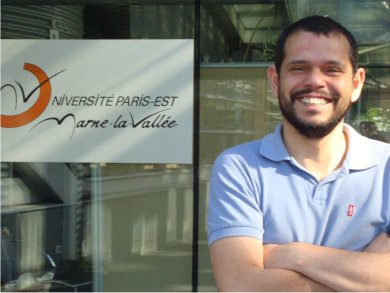Paris, the Laboratory and New Experiences
After looking at how and why I chose Paris, I am finally going to talk about my experiences here. As I mentioned in a previous post, I have lived abroad before, which made my arriving in France easier than it would nave been otherwise. So, I think it is time to start telling you about my laboratory.
From my first contact with the lab I could see that Prof. Dezzoti was right: The people in the lab are great! To my surprise, most of them are not French, which is interesting. There are Turkish, Spanish, Equatorian, Tunisian, Lebanese, Macedonian, Chinese, Mexican, Romanian, Algerian researchers … I have to confess that, sometimes, I’ve felt as if I was in a United Nations meeting.
The lab is used to hosting people from across the globe. It is very common for students and researchers to come from abroad for short research periods. Because of this, my arrival was just one more ordinary event and people saw me as the same as everybody else, which makes fitting in much more instantaneous and my situation easier.
For the first few months, I shared an office with a Tunisian PhD student and a Chinese invited researcher. The Chinese guy did not speak French and most of the time we spoke in English. The Tunisian girl was studying English and took advantage of the situation to practice it (despite my poor English). However, I think it is better not to detail the theme “culture” now. This deserves an exclusive post …
The Babel tower of cultural exchange was something I was looking forward to. Brazil is too far from a lot of things that are (or were …) the central topics of discussion worldwide. We read or hear about them, but an ocean keeps the true facts away from us (figurative and literally …). If you want to talk about Chinese socialism, then there is nothing better than to do that with a Chinese person; or if you want to learn about immigration in Europe, who can discuss it better than Europeans and North-Africans? Besides, I’m sure that other people will also be interested to learn how a country governed by a unionist supported by ex-guerilla soldiers can work so well. Actually, you would be amazed at how many people do not know that Rio de Janeiro is not Brazil’s capital, or that we do not speak “Brazilian” or Spanish …
Something I experienced during a coffee break in the lab can explain what I am talking about: as a group, we were discussing the Palestinian situation. In addition to myself and several others, a Muslim and a Jew were present. For an ordinary Brazilian (like me, for example …), this scene would be considered, at least, unusual. In Brazil we do not see Muslims or Jews in the streets and it is generally accepted that they do not talk to each other. If this sort of conversation is normal: fine … This is normal, and I learned something. If it’s not … then, I witnessed a scene that is really uncommon. Either way, the situation was great for me.
Now, in the second stage of my post-doc, I share my office with two French people — This is where the inter-cultural learning really begins …
Related Posts:
- Post-Doc In Paris 1 >>>
- Where did the idea come from? Post-Doc In Paris 2 >>>
- Preparing to come to Paris …Post-Doc In Paris 3 >>>
- Administrative Matters and Housing – Post-Doc in Paris 4 >>>
- Part 6 >>>





É fantástica a possibilidade de saber como um profissional brasileiro se desenvolve em terras “além mar” em busca de melhor posicionamento tecnológico e profissional, novidades, dificuldades, enfim,…. Muito bom!